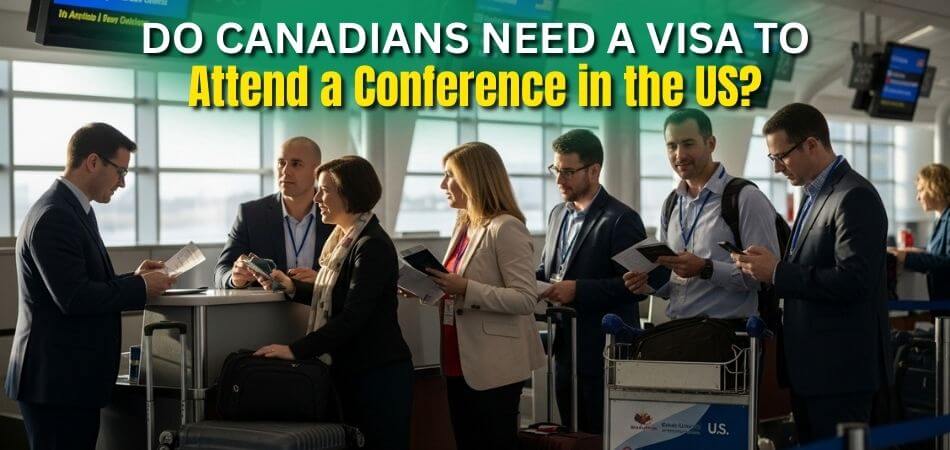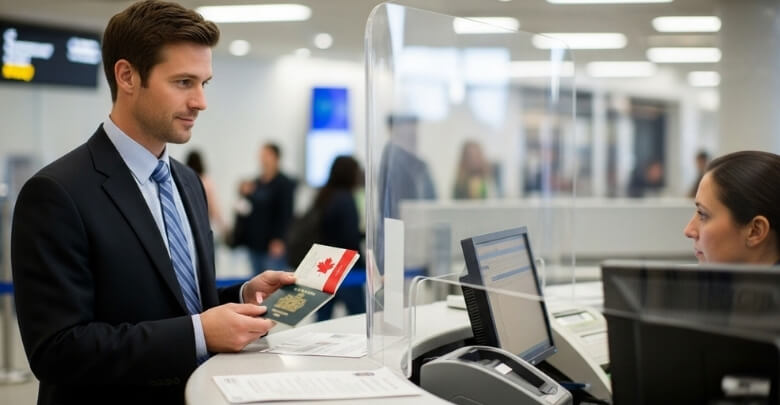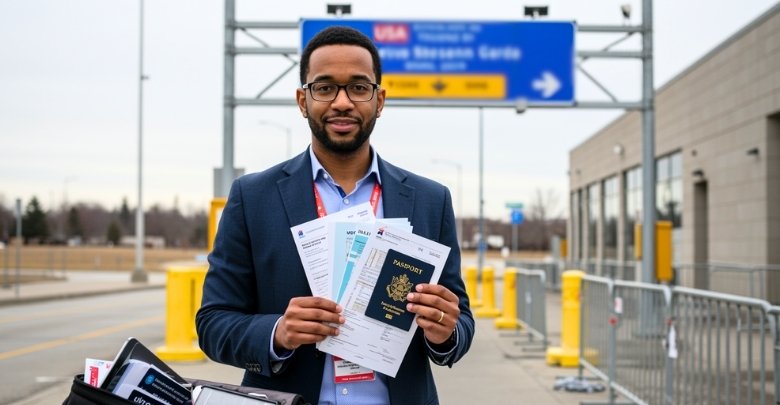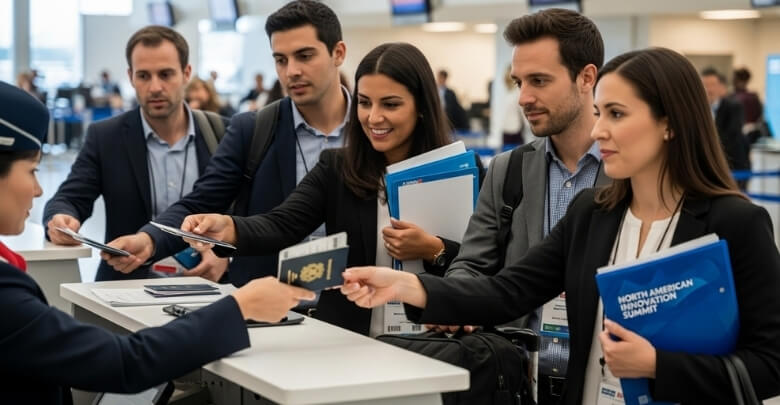For Canadians, the chance to attend a U.S. conference often feels like the perfect career boost. These events bring together leaders, innovators, and peers in one place. Yet, the excitement sometimes fades quickly when travelers face a familiar question before planning their trip.
Do Canadians Need a Visa to Attend a Conference in the US is a concern many professionals share. The answer is reassuring: Canadian citizens do not need a visa for short-term business visits. Instead, they can enter under B-1 business visitor status.
However, skipping the visa step doesn’t mean skipping preparation. Border officers still expect proper documents, clear answers, and valid travel plans. Keep reading to discover exactly what you need to carry, how to prepare, and the rules you should know before attending your U.S. conference.
Do Canadians Need a Visa to Attend a Conference in the US?
No, Canadians do not need a visa to attend a conference in the United States for short business visits. They are admitted under B-1 business visitor status, which functions as the standard US visa for conference and other professional events. This makes it straightforward for Canadians who want to attend professional events. All you need is proof of your plans, such as conference details and your return ticket.
It’s important to remember that B-1 status is for temporary visits only. It does not allow paid work, long stays, or full-time study. At the border, officers may ask about your purpose of travel, so answer clearly and honestly. Carrying supporting documents like your invitation letter, hotel booking, and return flight details will help show that your trip has a clear and valid reason.
Even though no visa is required, preparation is still key. Your passport must be valid, your travel details easy to explain, and your return plans confirmed. Canadian travelers are expected to prove that they will leave the U.S. once the conference ends.
To make entry stress-free, it’s not enough to know the rules; you’ll also need to show the right paperwork at the border. Below are the key documents you should bring.
Border Document Checklist for Canadians
- Valid Canadian Passport: Your passport must be valid for the entire trip. Ensure all details match your travel information exactly, as inconsistencies can cause delays or extra questioning at the border.
- Conference Invitation Letter: Bring the official invitation letter from the organizers. It should include the event name, dates, location, and your role, showing that your purpose of travel is clear and professional.
- Proof of Registration: Print your registration confirmation or keep a digital copy. This serves as evidence that you’re officially attending and helps officers quickly confirm your participation in the event.
- Return Flight Itinerary: Carry your round-trip flight booking showing travel dates. A confirmed return ticket proves your intention to leave the United States promptly after the conference ends.
- Hotel Booking Confirmation: Include your hotel reservation or accommodation details. This helps confirm where you will be staying and shows that you have planned arrangements for your temporary visit.
- Employer or Institution Letter: A letter from your job or school stating your role, purpose of travel, and approval of your trip provides credibility, whether you’re attending a conference or part of Canadian travel to USA for business meeting arrangements.
- Bank Statement or Proof of Funds: Show you can cover your expenses by carrying a recent bank statement or financial proof. Officers want to confirm you will not face money issues during your stay.
- Travel Insurance Details: Keep a copy of your travel or health insurance policy. This shows preparedness for emergencies and reassures officers that you won’t be a burden on U.S. healthcare services.
- Emergency Contact Information: Write down the name and contact details of a family member or workplace contact in Canada. This may be requested if officers need to verify personal details.
- Conference Schedule or Agenda: Print the official agenda showing sessions, dates, and times. This outlines your planned activities and reinforces that your main purpose is attending the professional event.
To sum it up, Canadian citizens do not need a visa or ESTA to attend conferences in USA, but they must still prove that their visit is temporary and business-related. If you carry the right documents and answer questions confidently, your entry will be smooth, and you can focus on making the most of your event.
What Is B-1 Business Status for Canadians?
When Canadians travel to the U.S. for conferences or meetings, they usually fall under the B-1 business visitor category. This category is meant for short-term business trips and comes with clear rules about what’s allowed and what isn’t. Understanding these rules helps you stay within legal limits and avoid problems at the border. Let’s look at the details.
What’s Allowed Under B-1 Status
- Attend Conferences and Seminars: Canadians can take part in professional conferences, trade shows, or seminars that relate to their field of work. You may attend sessions, network, or even present, provided no payment or U.S. employment is involved.
- Business Meetings: You are allowed to meet with colleagues, clients, or partners to discuss business plans, review strategies, or explore future projects. These meetings should be short-term and focused on discussion rather than doing hands-on work.
- Contract Negotiations: Negotiating or signing contracts with U.S. businesses is permitted under B-1. You can review proposals, settle agreements, and finalize deals, as long as the actual execution of the work is not carried out in the U.S.
- Training Sessions: You may attend classroom-style training sessions or company demonstrations that help develop your professional knowledge. These are allowed if unpaid, meaning you’re there to learn and observe, not to perform tasks for a U.S. company.
- Site Visits and Inspections: Visiting company offices, inspecting equipment, or checking on facilities in the U.S. is also acceptable. These visits should be for observation, research, or oversight purposes, not for actively taking part in operations or labor.
What’s Not Allowed Under B-1 Status
- Paid Work in the U.S: B-1 status does not allow Canadians to be hired by U.S. companies. Receiving wages, joining the payroll, or performing work tasks locally is strictly prohibited without the proper employment visa.
- Long-term Study: Enrolling in a school, university program, or even extended classes is not allowed under B-1. If your main purpose is studying, you must apply for a proper student visa, such as an F-1.
- Employment-based Activities: Performing duties similar to an employee, even on a temporary basis, is outside the scope of B-1. Any activity that replaces a U.S. worker or provides services for hire requires separate authorization.
- Extended Stays Without Approval: Staying beyond the date authorized on your I-94 entry record is not permitted. If you need more time, you must formally request an extension before your approved stay runs out.
B-1 business status gives Canadians an easy way to attend U.S. conferences, meetings, and short-term business activities without needing a visa. Just remember the limits: no paid work, no long-term commitments, and no overstaying your permitted time.
ESTA, Visa, or B-1: What Applies to Canadians?
When Canadians start planning a trip to the U.S. for a conference, the rules around entry can feel confusing. Some wonder if they need an ESTA, while others assume a visa is required. The truth is a little simpler once you know the difference. Let’s clear this up so you can travel with confidence and avoid unnecessary paperwork.
Do Canadians Need ESTA?
No, Canadians do not need an ESTA (Electronic System for Travel Authorization). ESTA is part of the visa waiver program, which applies to other countries but not Canada. Instead, Canadians are admitted directly at the border and placed under B-1 business visitor status for conference trips or short-term business activities.
Canadian Citizens vs. Canadian Permanent Residents
- Canadian Citizens: If you hold a Canadian passport, you can attend conferences, business meetings, and other short-term professional events in the U.S. without applying for a visa or ESTA. You’ll simply need to present your documents and explain your purpose at the border.
- Canadian Permanent Residents (PRs): If you’re a PR in Canada but not a Canadian citizen, your entry depends on the passport you hold. For example, if your passport is from a country that requires a U.S. visa, you must apply for the appropriate visa before attending a conference, even though you live in Canada.
Where to Learn More
If you’d like a more detailed breakdown of all the options for attending conferences in the U.S. as a Canadian or Canadian PR, check out our Canada Business Visitor Guide for step-by-step details and examples.
Briefly, Canadian citizens don’t need an ESTA or visa for U.S. conference visits, but Canadian permanent residents may have different requirements based on their nationality. Knowing this difference saves you time and ensures a smooth entry at the border.
How to Prove the Purpose of Your Conference Visit?
Attending a conference in the U.S. means border officers will want to confirm that your trip is professional and temporary. Having the right documents ready is the best way to show your purpose clearly and avoid unnecessary delays. Let’s go over the essentials you should bring to support your case.
Conference Invitation Letter
An invitation letter from the event organizer is one of the strongest proofs you can carry. It should include your name, event title, dates, and venue. This document confirms that you are expecting and attending for a legitimate business reason.
Proof of Registration
Your registration receipt or confirmation email shows you have formally signed up for the event. Whether you’re participating in a business summit or attending an education conference in the USA, this proof reassures officers that you are genuinely registered.
Event Schedule or Agenda
A copy of the event schedule outlines your planned activities during your stay. Having dates, session names, and times makes your visit look structured and professional, rather than open-ended or casual.
Hotel Booking Confirmation
Proof of accommodation provides another layer of credibility. Whether it’s a hotel booking or confirmation from a host, this shows you have made arrangements to stay only for the period of your event.
Return Flight Itinerary
Nothing proves intent to leave better than a confirmed round-trip ticket. Showing your return flight reassures officers that you’re planning to exit the U.S. on time and not extend your stay without permission.
Employer or Institution Letter
A letter from your workplace or school is highly useful. It confirms your role, the purpose of your travel, and approval from your employer or institution. This ties your trip directly to your ongoing responsibilities back in Canada.
Proving your purpose doesn’t need to be complicated; just gather the right set of documents and keep them handy at the border. Clear evidence of your plans makes the process smoother and helps you start your conference experience without stress.
What to Expect at the Border?
Crossing into the U.S. for a conference can feel a little tense, but it doesn’t have to be. Border officers mainly want to confirm that your visit is professional, temporary, and supported by the right documents. Knowing the kinds of questions they might ask and how to answer them will make the process smoother. Let’s walk through a few examples you can practice before traveling.
Mini Q&A Script for Canadians Attending a U.S. Conference
- Officer: What is the purpose of your visit?
Traveler: I am attending the [Conference Name] in [City]. It is a professional event running from [Start Date] to [End Date], and I have my registration and invitation letter with me. - Officer: How long will you be staying in the United States?
Traveler: I will be staying for [X days]. My return flight is booked for [Date], and I have a copy of the itinerary to show you. - Officer: Where will you be staying during your visit?
Traveler: I have a confirmed hotel booking at [Hotel Name], located in [City]. Here is the booking confirmation with the check-in and check-out dates. - Officer: Who is covering the cost of your trip?
Traveler: The expenses are covered by my employer, [Company/Institution Name]. In some cases, travelers are sponsored to participate in an international conference for free, but in my situation, the costs are managed by my employer, and I also have proof of funds. - Officer: Are you going to work or take employment in the U.S.?
Traveler: No, I will not be doing any paid work. My visit is strictly for attending the conference and related sessions.
Border checks are routine, and officers simply want to verify your story and documents. Keeping answers short, polite, and supported by proof is the best approach. Preparation makes the process faster and gives you peace of mind.
Can Canadians Extend Their Stay After a US Conference?
Sometimes a conference trip ends up creating new opportunities, like additional business meetings or extended training sessions. In such cases, Canadians may wish to stay in the U.S. longer than originally planned. While this is possible, you must follow the correct process. Let’s look at how to extend your stay step by step.
Step 1: Check Your I-94 Expiry Date
The I-94 record you receive at entry shows the exact date you must leave. This is more important than your passport or visa validity. Always confirm this date early to avoid overstaying, which can create problems later.
Step 2: Complete Form I-539
Form I-539 is the official application for requesting more time as a visitor. You can file online or by mail. Double-check that your personal details, travel information, and reason for staying match your entry documents to avoid delays.
Step 3: Apply Early
Timing is very important. You should submit your extension request at least 45 days before your I-94 expires. Applying late often results in denial, and overstaying may negatively affect future U.S. travel. Early planning gives you an advantage.
Step 4: Provide a Valid Reason
U.S. immigration officers will only approve an extension if you give a logical reason. This may include extended conferences, new networking opportunities, or added training sessions. Always attach supporting documents like updated schedules, meeting invitations, or employer letters.
Step 5: Show Financial Proof
To be approved, you must prove you can cover expenses for the extra time without working in the U.S. A recent bank statement, employer funding letter, or financial guarantee is usually required to show you will remain self-sufficient.
Extending your stay after a U.S. conference is possible, but it requires careful timing, strong evidence, and proper paperwork. By applying early, preparing documents, and showing a valid reason, you can increase your chances of getting approval smoothly.
Special Cases Where Canadians Do Need a Visa
Most Canadian citizens can attend short-term business events or conferences in the U.S. without applying for a visa. However, there are some clear exceptions where a visa is required. These cases are important to understand, as arriving unprepared may lead to complications at the border. Let’s look at the most common situations in detail so you can plan ahead with certainty.
Long-term Stay (More Than Six Months)
B-1 business visitor status is only intended for short visits. If you want to remain in the U.S. for more than six months, visa-free entry no longer applies. A proper visa becomes necessary, tailored to your reason for staying, such as work, study, or extended research. Having proof of your purpose and documentation ready is key.
Work or Study in the U.S.
Canadians cannot use a B-1 status to take on employment or enroll in a degree program. If your plans involve working, you will need a specific work visa, such as an H-1B. If you want to study full-time, you must apply for a student visa, such as an F-1. These visas require applications in advance and proper approval from U.S. authorities.
Canadians With Certain Passports (Permanent Residents)
If you are a permanent resident of Canada but not a Canadian citizen, your entry depends on the passport you hold. For example, if your citizenship is from a country that requires a U.S. visa, you must apply for one, even though you live in Canada. Citizenship, not residency, decides your entry requirement.
Past Immigration or Overstay Issues
A past overstay, deportation, or certain criminal records can make visa-free entry unavailable to Canadians. In these cases, a visa application is necessary, and sometimes a waiver is also required. Even minor past issues can raise red flags, so applying with full disclosure is safer than risking denial at the border.
While most Canadians enjoy easy entry to conferences, exceptions do exist. Longer stays, work, study, or certain personal circumstances require a visa. Knowing these special cases in advance helps you avoid delays and ensures your trip goes smoothly from start to finish.
Frequently Asked Questions
After learning the basics of conference travel to the U.S., many Canadians still have smaller questions that come up during planning. These details may seem minor, but knowing the answers can save you time and reduce stress at the border. Here are some common FAQs that travelers often wonder about.
Can I Bring Presentation Materials With Me?
Yes, you can bring items like brochures, slides, or posters for your conference. Make sure they are clearly related to your event and not intended for commercial sales. Having them labeled or documented helps avoid confusion at customs.
Do I Need Travel Insurance for a Short Conference Trip?
While not required, travel insurance is strongly recommended. Medical care in the U.S. is expensive, even for minor issues. A basic policy covering emergencies or accidents provides peace of mind and shows responsible preparation for your trip.
Can I Combine Business and Tourism on the Same Trip?
Yes, you can mix conference attendance with sightseeing, as long as the main reason for your trip remains business. Always be clear at the border about both parts of your plan. Carry proof of both business and leisure bookings.
Is It Okay to Drive Into the U.S. for a Conference?
Yes, Canadians can drive to a U.S. conference if they prefer road travel. At land borders, officers will ask the same questions about your trip’s purpose. Keep your event documents, hotel booking, and return plans within easy reach.
Can I Be Reimbursed for Conference Expenses?
Yes, reimbursement for travel costs like flights, hotels, or meals is usually allowed under B-1 status. What’s not permitted is direct payment for work. Keep receipts organized and be ready to explain that these are expense reimbursements, not wages.
What Happens If My Passport Expires Soon?
Your passport must be valid for the entire duration of your trip. If it is close to expiring, renew it before traveling. An expiring passport can create problems at the border and may cause officers to shorten your authorized stay.
Do I Need to Show Proof of Funds for a Short Stay?
It’s not always requested, but it’s smart to carry a recent bank statement or employer letter confirming financial support. This reassures officers that you can cover expenses during your visit without needing income from U.S. sources.
Concluding Lines
Attending conferences in the United States can be a rewarding experience for Canadians, offering opportunities to connect, learn, and grow professionally. Still, many travelers pause to ask: Do Canadians Need a Visa to Attend a Conference in the US?
The answer is simple, Canadian citizens do not need a visa for short business visits such as conferences. Instead, they are admitted under B-1 business visitor status. However, careful preparation is still necessary to ensure smooth entry and avoid delays.
Having the right documents, clear travel plans, and confidence at the border makes all the difference. With the proper steps, Canadians can focus less on paperwork and more on gaining valuable knowledge and connections during their U.S. conference experience.









